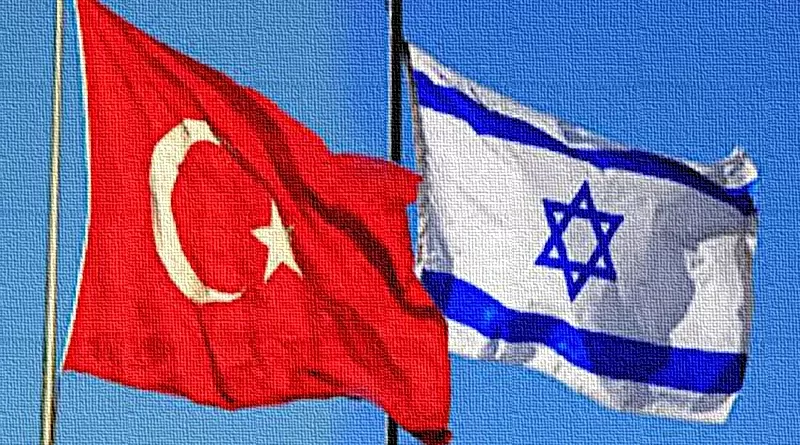Turkey And Israel: What Lies Behind The Recent Volte Face
By MEI
By Gonul Tol for MEI
In recent months, the Israeli-Turkish relationship, strong and stable during the 1990s, has been placed under severe pressure. Tensions began in January 2009 when Israel launched military operations in Gaza, later prompting Turkish Prime Minister Recep Tayyip Erdogan to walk out of a televised debate with Israeli President Shimon Peres following a heated exchange over the issue. Relations were further strained in early January 2010 when the Turkish ambassador to Israel was summoned to a meeting by Israeli Deputy Foreign Minister Danny Ayalon and subjected to a humiliating public reprimand in protest to a Turkish television series that included a scene in which an Israeli soldier shoots a Palestinian child.
It seems that the Turkish-Israeli love affair of the initial post-Cold War days is over and a new era in bilateral relations has begun. The volte face in Turkey’s policy vis-à-vis Israel has been attributed to a range of issues including: the rise of Islamism in Turkey, the ascendancy of the Justice and Development Party (AKP), Ankara’s need for petrodollars, and Turkey’s attempts to strike a balance between the Middle Eastern and European aspects of its identity, to name a few. Only scant attention has been paid to the changing geopolitical and structural factors which have driven Turkish policy in the Middle East – and toward Israel in particular.
Turkish-Israeli rapprochement in the 1990s was the outcome of Turkey’s perception of geopolitical necessities at the time. The end of the Cold War brought about new regional dynamics which Turkey wanted to exploit in order to retain its strategic importance to the West. Turkey’s foreign policy vis-à-vis the Middle East in this period was directly tied to security concerns, which made the security defense establishment, especially the military, the main actor in the formulation of Turkish foreign policy. The new national military strategic concept of the post-Cold war era identified two threats facing the Turkish state: Kurdish irredentism and Islamic fundamentalism which were mainly fed by two external actors, Syria and Iran. Within the context of deteriorating relations with these countries, the Turkish elite saw strategic cooperation with Israel as a way of securing the territorial integrity of the country and the survival of the secularist regime. The United States, which was trying to create a “new Middle Eastern order,” supported the rapprochement between Israel and Turkey. Ankara’s disappointment with its own pro-Arab tilt of the mid-1960s to the 1980s, especially on the issue of Cyprus, made an alliance with Israel an attractive strategic alternative. Initiation of the Arab-Israeli peace process in 1991 removed the last barrier toward strategic cooperation with Israel.
In the first decade of the twenty-first century, the geopolitical and structural factors that brought Israel and Turkey together in the 1990s have changed dramatically, altering Turkey’s threat perceptions. The influence of the military, the chief architect of the Turkish-Israeli rapprochement in the 1990s, has declined as a result of the European Union reform package that went into effect in 2003. As the civil-military balance in foreign policy making changed in favor of civilian forces, Turkey moved away from a security-oriented foreign policy discourse to one that increasingly stresses soft power.
With the rise of a new foreign policy elite, non-traditional forces such as cultural and commercial interests have become the “primary currencies” in foreign policy-making. The pursuit of economic interest has become one of the main elements of Turkey’s diplomacy, especially in the Middle East. Within this newly desecuritized and multi-dimensional foreign policy approach, Israel lost its privileged position. Syria and Iran, once considered as the common enemy, have become Turkish allies, decreasing Turkey’s need for a strategic partner in the South to counterbalance Damascus and Tehran. In addition, in the aftermath of the 2003 US-Iraq war, rising Kurdish nationalism in northern Iraq replaced Syria and Iran as the main threat to Turkish security.
The rumors that Israeli intelligence and military operatives are quietly at work in the Kurdistan Regional Government, providing training for Kurdish commando units and running covert operations inside Kurdish areas of Iran and Syria added to the ambiguity toward Israel’s role in the region. Turkey’s strong reaction against Israel’s three week offensive in Gaza in December 2008-January 2009 that claimed the lives of 1400 civilians crystallized the changes in Turkey’s understanding of geopolitical necessities, apprising the start of a new era in bilateral relations.
Today there is a new regional setting in the Middle East where Turkey’s threat perceptions – and interests — are different from those in the 1990s. A recalibration of bilateral relations between Turkey and Israel requires recognition of this new geopolitical setting. Those who long for the golden age of Turkish-Israeli rapprochement in the 1990s should be ready for a long wait, as it is quite unlikely that the quality of the bilateral relations will return to its 1990s’ level in the near future.
Gonul Tol is Director of the Center for Turkish Studies and Adjunct Scholar. Assertions and opinions in this Policy Insight are solely those of the above-mentioned author(s) and do not necessarily reflect the views of the Middle East Institute (MEI), which expressly does not take positions on Middle East policy, and where this article first appeared and is reprinted with permission.

